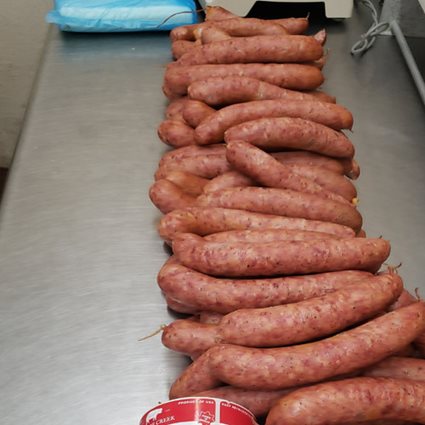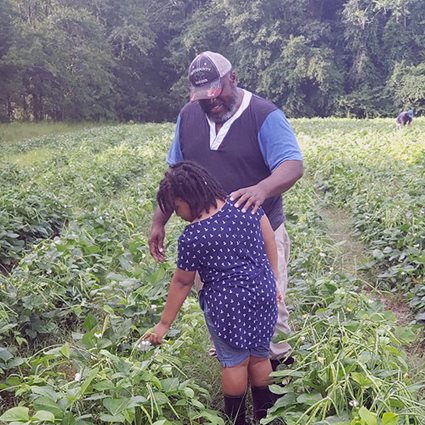Read "Reaching out to black farmers," part 1 of our two-part story that details how NeighborWorks organizations like Wealth Watchers support black farmers in rural communities.
 Kiana Harper was fresh out of Florida Agricultural and Mechanical University when she started working as an outreach specialist for Wealth Watchers' Comprehensive Rural Outreach Program (CROP). She worked with farmers on grants and on making sure they had the right paperwork to go to the U.S. Department of Agriculture (USDA). That meant making sure they had farm numbers, which come through the USDA's Farm Service Agency and are like social security numbers for farms. Many didn't, she says, so that was a first step. "Some farmers had never been in a USDA office, so we walked in the door with them."
Kiana Harper was fresh out of Florida Agricultural and Mechanical University when she started working as an outreach specialist for Wealth Watchers' Comprehensive Rural Outreach Program (CROP). She worked with farmers on grants and on making sure they had the right paperwork to go to the U.S. Department of Agriculture (USDA). That meant making sure they had farm numbers, which come through the USDA's Farm Service Agency and are like social security numbers for farms. Many didn't, she says, so that was a first step. "Some farmers had never been in a USDA office, so we walked in the door with them."
She remembers the first time she took a farmer into a USDA office. He had a small farm and wanted to be able to accept food stamps, so stamp recipients could buy fresh food, she says. "We walked into an office to present all of his identification and to get the application submitted."
Harper says she'd studied the mistrust between farmers and the USDA at Florida A&M, a historically black university in Tallahassee. They'd discussed the Civil Rights lawsuit that black farmers had filed against the USDA, so she wasn't surprised when she met farmers who said they'd never been past the front door at the government office, farmers who said they had watched their white neighbors get loans or grants that they had been denied.
"They were expecting so little," she says. "But we wanted to show them how much they could gain. It was my duty to show them they could trust me if they didn't have trust in the system."
She started by organizing meetings, especially in rural areas. She spent a lot of time on the phone and in the car, going from Florida to Georgia and back. She followed up with the USDA and then explained to farmers procedures they needed to follow and boxes they needed to check. When the farmers started getting responses from the USDA, she says, she started hearing from more of them. "Word of mouth has been a good thing for us. I had people calling that I'd never spoken to before, but the farmers told their friends and family and neighbors about us."
Carrie Davis, president and CEO of Wealth Watchers, says that through CROP, they've assisted 50 farmers with obtaining farm numbers, which is the first required step in order to access USDA programs. Wealth Watchers also became a revolving loan lender, using a USDA loan product specifically for small, rural businesses, including farmers. To date, Wealth Watchers has made over $300,000 in loans.
Dexter Pearson, who until two years ago served as an outreach adviser for rural development with USDA and now works for rural development's information technology office, says the government organization was aware that lack of trust was a barrier. He can tell that trust has grown over the past few years by the growth in attendance at USDA events in rural regions.
Pearson says he and Davis had discussed the idea of Wealth Watchers expanding to agriculture before the CROP initiative even began.
Some minority farmers didn't know about USDA programs, he says, like the natural resource conservation program that offers free conservation plans, including crop suggestions, for those who have farm numbers. Others had been deterred by previous experiences and confusion over policies, which differed from state to state. And yes, Pearson says, some were deterred by discrimination.
Davis and her colleagues immersed themselves in learning about rural issues, he says. "They're committed to the community. They're committed to having an impact in the community and seeing that people who live in these communities are successful and can be successful."
They learned the language and were able to talk to both the government and the farmers, Pearson says. They made people comfortable and they knew how to answer questions. "They started to help us increase the number of people who participated in our programs."
USDA's goal, he says, is to reach more minority farmers and ranchers, educate them, increase program participation, and help the people who need the help. Groups like Wealth Watchers, who have their feet on the ground in communities, can help achieve those goals, he says.
Focus on the Future
 Ricky Dollison, a black farmer from Poulan, Georgia, who raises pigs and grows row crops, has his focus on the future.
Ricky Dollison, a black farmer from Poulan, Georgia, who raises pigs and grows row crops, has his focus on the future.Farming in 2020 sees him joined with other black farmers in the raising of hogs for his meat business. He also mentors young farmers and is currently helping a 19-year-old man whose parents wanted him to experience the life of a farmer before taking the next steps toward becoming one.
Dollison's daughter, Leiandra Dollison McLemore, convinced him to grow loofas this spring. And they'll be growing bitter melons for Asian markets. "We're trying to stay abreast of the new things that are coming and also stay with what I'm doing. We're all the time planning and looking into new things."
Right now, they are getting the land ready to plant vegetable seeds. "We're increasing our sausage-making and our herd," he says. "We're going to purchase a few beehives. Our goal is to use all of the land."
Dollison rises early and checks his emails, pricing and the news. It sounds awful, he says, but if there's a catastrophe somewhere in the world, where crops are flooded, for example, it might mean he should increase his crops of that variety because prices will go up. Then he's outside to feed the livestock and make sure all is well. Afternoons are for marketing and planning. Evenings he's back on his email again.
In the spring, he plants his row crops, like peanuts. And he raises his pigs for his sausage business — Warrior Creek Premier Meats. "Gluten free, no MSG, a good lean sausage," he says. As his business has grown, in addition to his own 78 pigs, he contracts with other black farmers, feeding their pigs the non-GMO corn that he also grows.
It isn't a co-op, exactly. "We call it a relationship," he says simply. "They didn't have a market and I did. I don't try to lowball them. I pay above market price."
Taking care of the pigs often falls to McLemore, who is also charged with social media and keeping the farm and the sausage visible.
If there are few black men in farming, there are even fewer black women. But McLemore, who returned home in 2014 after working as a paralegal in Atlanta, has embraced it in a way she hadn't expected, ever since the day she waded into a puddle to grab a new baby piglet as it was being birthed. "I just remember it being: 'I'm a hog farmer.' It felt so natural. I didn't realize how much it had been ingrained," she says.
McLemore talks about trust, too: trust in her dad, which is the reason she came home to help. "He knew what he was doing," she says. As she wanders the land and finds hog houses that her grandfather had built years ago, she feels like she's in the right place.
When he was alive, she says, "my granddaddy would put us in the truck and show us the land and say, 'This is yours.'" But she didn't think about putting it into production until her father got things started again.
"It got my heart beating," she says. "I did not know the passion I had for raising animals."
She says their goal isn't just to preserve what her grandfather and Big Daddy set up for them; it's to build a future.
Being a black farmer, McLemore says, gives her pride. "I count it an honor to be able to continue what Granddaddy started." She says it's exciting to know she's walking the same trails he walked, and to have her grandmother nod and say, "This is what your granddaddy did."
"Before my grandma closes her eyes, and my daddy as well, I want to let them know that I've paid attention, and that I am putting things in place to make sure that when it's my turn to take care of the land, that's what's going to happen," McLemore says. "I'm going to teach my child and my cousins and everybody about how we will maintain, how we will keep and preserve this land for generations to come."

